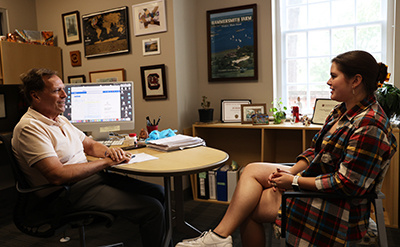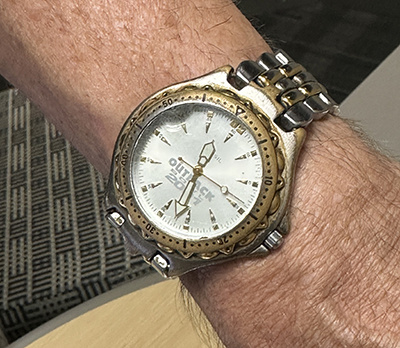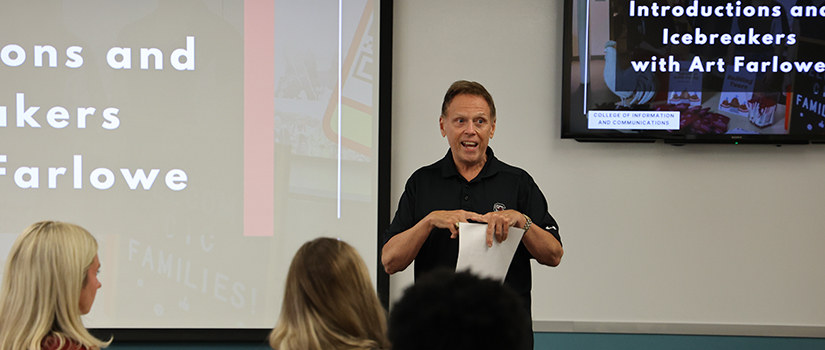
Art Farlowe did not have the sublimely iconic college experience he was hoping for as a freshman at a small, private liberal arts college in his native North Carolina. That unsatisfying “meh” feeling was something he is determined to spare students in his role as senior academic advisor in the College of Information and Communications.
During his more than 30 years at USC, he has been recognized as the Ada B. Thomas Academic Advisor of the Year as well as a finalist for the Freshman Advocate Award and the University 101 Teacher of the Year.
For three decades, Farlowe has helped students excel academically while creating lifetime memories. The fact that USC ranks No. 1 nationally for students’ First-Year Experience is no accident.
Where are you from originally, and what brought you to USC?
I grew up in the country, a small town called Ramseur, North Carolina. I began college
at Wingate University near Charlotte, where I earned a bachelor’s in early childhood
education. Not quite sated for knowledge, I moved south to attend USC, earning a second
bachelor’s in history and African American studies as well as a master’s in education/student
personnel services.
Tell us about your early career in higher education.
I worked at USC Sumter for two and a half years in student activities and orientation.
Then I wanted to do something completely different, so I moved to Bridgewater, Massachusetts,
where I worked as a residence hall director at Bridgewater State University for three
years. It was a great experience.
When I returned to USC in July 1994, I continued to work in student housing for about four more years. Then I moved into distance education and later became an advisor in the psychology department until 2006. I have been advising with the journalism school ever since.
I try to make college 'a little bit smaller' for students, so they know they have a safe place to go. Advising is teaching students how to make decisions. It’s teaching them how to find out what they are good at and what they like.
-- Art Farlowe
How did you come to be an academic advisor at USC?
I was serving as a tutor to the football team and found that many players asked me
academic advising-type questions. Answering the players’ questions got me thinking
about academic advising. After that, I became an undergraduate advisor.

What do you like most about academic advising?
I like building relationships with students. In my University 101 class, I tell students
on the first day to put my cell phone number in their phones and that they have a
university contact for the next four years. I tell them I will even come and bail
them out of jail if needed — one time. Basically, I try to make college “a little
bit smaller” for students, so they know they have a safe place to go. Advising is
teaching students how to make decisions. It’s teaching them how to find out what they
are good at and what they like. My students are always emailing me, calling and coming
back to see me. I like that.
What questions do you get from students most often?
They almost always ask how long it will take to graduate. But I also want them to
enjoy the journey. Everyone wants to find friends with the same interests and to do
fun college things. I want our students to have that kind of experience. Often they
share that they aren’t sure they can do this. They are scared. They worry a lot. So
I act kind of like a mentor and try to build up their confidence. With freshmen, I
just try to help them navigate that first year.
What do you wish you had known at the beginning of your own college days?
I hated my first year at Wingate. I went home every Friday and didn’t come back until
Monday. Looking back, I wish I had gotten involved in something at the school and
given it more of a chance.
What are some of your fondest memories of working at USC?
(Farlowe gestures toward an uncharacteristically flashy wristwatch on his arm.)

This is a 2001 Outback Bowl watch. A student football player I advised gave it to me. One day, he called me and wanted to visit. He handed me his Bowl watch. I said, “I can’t accept that!” But he insisted I take it. He never got to play in another bowl game because he got hurt. He was grateful I had confidence in him. The following year, I went to the Russell House and bought him a USC watch as a graduation gift.
What have the students taught you over the years?
That your age doesn’t define you. The students have helped me keep a younger and younger
mindset. By doing this job, I have the luxury of staying 22 years old, forever.
Also, I’ve learned that our students have a stunning work ethic. They work much harder than I ever did. They take their school very seriously. They are doing way more than anybody I knew in college did, and many are doing it while going to school, volunteering and working full time.
After 30 years at USC, what never gets old?
When I leave work, the Rutledge Chapel plays the USC fight song every afternoon at
5 p.m. That never gets old. And, to me, the Horseshoe looks exactly the same as it
did 40 years ago. There is something comforting about that.
